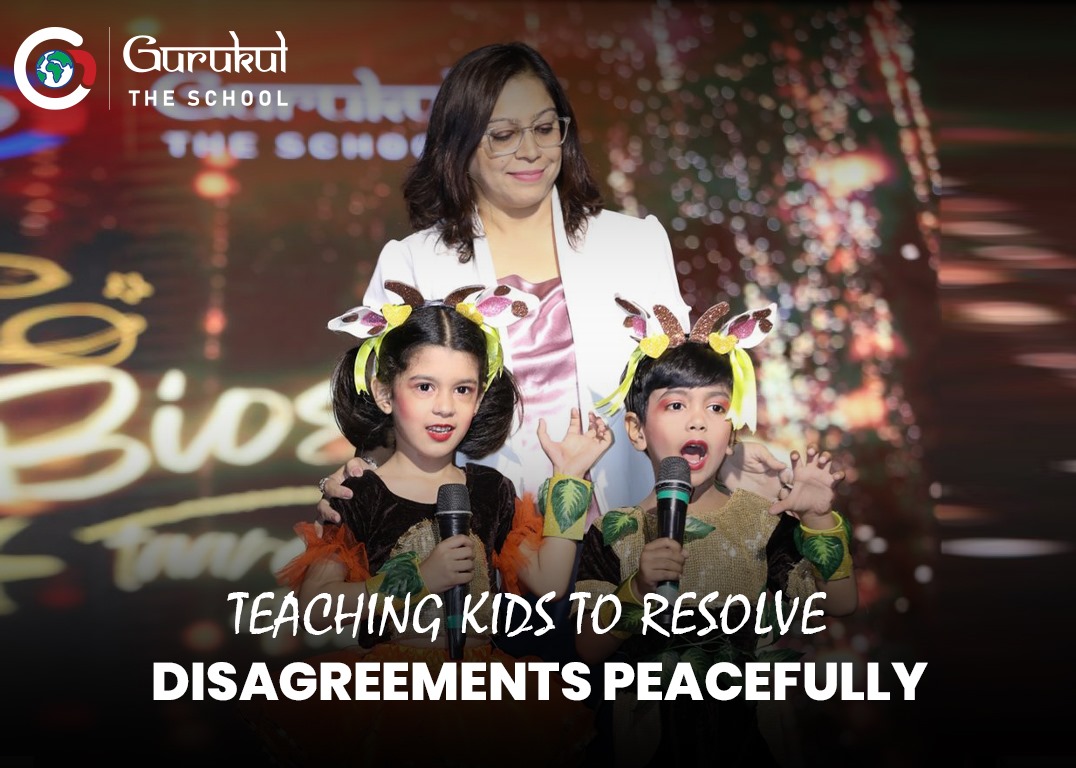Teaching Kids to Resolve Disagreements Peacefully
posted on Sep 04, 2024
Teaching Kids to Resolve Disagreements Peacefully

Have you ever rushed to your child in the park to stop a brewing dispute between them and another child? Maybe they were fighting over their turns to sit on the swing, or they entered a verbal spat because one child felt the game rules were unfair. Regardless of the reason that led to disagreements, it highlights a common fact—kids aren’t immune from disagreements. In fact, we have seen kids having a lot of disagreements with their classmates, friends, seniors, etc., because they tend to interact more with others during school hours. The point is that even if your child doesn’t have an active social life, s/he can still become prone to disagreements if their views don’t match that of their family members.
While most parents try to step up and solve disagreements for their kids, we at Gurukul The School, regarded as the top CBSE school in Ghaziabad, believe it isn’t the right approach. It can take away learning opportunities from your kids. If you want your kids to become independent and handle tricky situations maturely, stop getting into their fights and instead teach them the art of resolving disagreements on their own. You can start by implementing the following tips:
-
Teach Them to Remain Calm
If you have dealt with various disagreements, you will know how important it is to have a calm mind. When arguing or trying to prove our point, we often let our emotions take over our logical side. It not only prevents us from seeing things clearly but also clouds our judgment and decision-making processes.
Hence, a timeless way to resolve even the biggest disagreements is by acting with a calm mind. Having said that, keep in mind that you cannot teach your kids to remain calm within a few days because it is a skill that takes regular practice and time to become a part of an individual’s personality. To get started, encourage your kids to practice mindfulness regularly.
Deep breathing exercises, journaling, yoga, and meditation are great tools to train a mind to remain calm. You can also ask your kids to briefly distance themselves from chaotic scenes so they can think clearly and then handle it with a calm mind. Focusing on breathing and counting backward from 20 to 1 can also help them disassociate from intense emotions during disagreements.
-
Make Them Find Win-Win Solutions
We at Gurukul The School firmly believe that one can end even the biggest disagreements if by proposing a solution that works for everyone. Hence, if you want your kids to become great at finding win-win solutions for every disagreement, teach them active listening skills. This single skill can help them understand the other person’s desires, needs, point of view, etc., making it easier to find a solution that can instantly calm them down.
However, remember that your kids can identify solutions that care for the other person’s needs and their own needs. They don’t have to compromise every time to settle disagreements. You can practice role-playing scenarios regularly with your kids where you act as a stubborn individual who disagrees with everything your kid does and says. Tell them to find win-win solutions to end the disputes.
You can swap the roles with your kids every alternate day or bring in more characters. Even if your kid fails terribly in the initial days, they will develop the understanding, skills, and competence to formulate win-win solutions with time.
-
Make it Normal to Seek Adult Support
No matter how capable your kids are, they will always encounter disagreements where they will need adult supervision and guidance. If you want your kids to reach out to you for support without any hesitation or second-guessing, focus on creating a safe environment for them. Today, through this blog post, we would like to convey the message that seeking parental help in resolving disagreements is normal.
As a parent, you must also teach them what constitutes a big and small disagreement. For example, someone rolling their eye at them for a difference in opinion may be small. Conversely, a person threatening them with physical violence is an alarmingly big issue that requires parental intervention.
We would also like to recommend that parents follow a thumb rule: let kids find initial solutions independently and seek parental support when they still feel stuck. Then, based on the problem’s intensity and type, parents can pick solutions.
Conclusion
Kids cannot avoid disagreements, but they can learn how to handle them efficiently. While there are various ways to tackle disagreements, not all ways may work for everyone. Hence, we at Gurukul The School, recognized as the CBSE schools in Ghaziabad, have shared three timeless tips in this blog post that work for children of all ages and types. You can start implementing these tips and notice how these tips help improve your child’s disagreement-resolving abilities. If you think these tips aren’t working, consider talking to the kid’s school teachers, other parents, and professionals for personalized support and guidance.
However, before starting the journey to transform your children into disagreement-resolving maestros, remember that you won’t see positive results instantly. Hence, we encourage parents to remain patient and stick to each tip for at least a few weeks before switching to another tip. Eventually, you’ll start seeing results, and the wait will be justified